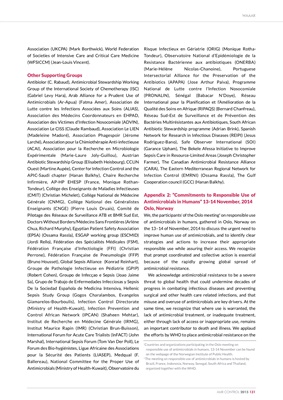
Association (UKCPA) (Mark Borthwick), World Federation
of Societies of Intensive Care and Critical Care Medicine
(WFSICCM) (Jean-Louis Vincent).
Other Supporting Groups
Antibiolor (C. Rabaud), Antimicrobial Stewardship Working
Group of the International Society of Chemotherapy (ISC)
(Gabriel Levy Hara), Arab Alliance for a Prudent Use of
Antimicrobials (Ar-Apua) (Fatma Amer), Association de
Lutte contre les Infections Associées aux Soins (ALIAS),
Association des Médecins Coordonnateurs en EHPAD,
Association des Victimes d'Infection Nosocomiale (ADVIN),
Association Le CISS (Claude Rambaud), Association Le LIEN
(Madeleine Madoré), Association Phagespoir (Jérome
Larché), Association pour la Chimiothérapie Anti-infectieuse
(ACAI), Association pour la Recherche en Microbiologie
Expérimentale (Marie-Laure Joly-Guillou), Austrian
Antibiotic Stewardship Group (Elisabeth Heisbourg), CCLIN
Ouest (Martine Aupée), Center for Infection Control and the
APIC-Saudi chapter (Hanan Balkhy), Chaire Recherche
Infirmière, AP-HP EHESP (France, Monique RothanTondeur),
Collège des Enseignants de Maladies Infectieuses
(CMIT) (Christian Michelet), Collège National de Médecine
Générale (CNMG), Collège National des Généralistes
Enseignants (CNGE) (Pierre Louis Druais), Comité de
Pilotage des Réseaux de Surveillance ATB et BMR Sud Est,
Doctors Without Borders/Médecins Sans Frontières (Arlène
Chua, Richard Murphy), Egyptian Patient Safety Association
(EPSA) (Ossama Rassla), ESGAP working group (ESCMID)
(Jordi Rello), Fédération des Spécialités Médicales (FSM),
Fédération Française d'Infectiologie (FFI) (Christian
Perrone), Fédération Française de Pneumologie (FFP)
(Bruno Housset), Global Sepsis Alliance (Konrad Reinhart),
Groupe de Pathologie Infectieuse en Pédiatrie (GPIP)
(Robert Cohen), Groupo de Infecçao e Sepsis (Joao Jaime
Sa), Grupo de Trabajo de Enfermedades Infecciosas y Sepsis
De la Sociedad Española de Medicina Intensiva, Hellenic
Sepsis Study Group (Gogos Charalambos, Evangelos
Giamarelos-Bourboulis), Infection Control Directorate
(Ministry of Health-Kuwait), Infection Prevention and
Control African Network (IPCAN) (Shaheen Mehtar),
Institut de Recherche en Médecine Générale (IRMG),
Institut Maurice Rapin (IMR) (Christian Brun-Buisson),
International Forum for Acute Care Trialists (InFACT) (John
Marshal), International Sepsis Forum (Tom Van Der Poll), Le
Forum des Bio-hygiénistes, Ligue Africaine des Associations
pour la Sécurité des Patients (LIASEP), Medqual (F.
Ballereau), National Committee for the Proper Use of
Antimicrobials (Ministry of Health-Kuwait), Observatoire du
Risque Infectieux en Gériatrie (ORIG) (Monique RothaTondeur),
Observatoire National d'Epidémiologie de la
Resistance Bactérienne aux antibiotiques (ONERBA)
(Marie-Hélène Nicolas-Chanoine), Portuguese
Intersectorial Alliance for the Preservation of the
Antibiotics (APAPA) (Jose Arthur Paiva), Programme
National de Lutte contre l'Infection Nosocomiale
(PRONALIN), Sénégal (Babacar N'Doye), Réseau
International pour la Planification et l'Amélioration de la
Qualité des Soins en Afrique (RIPAQS) (Bernard Chanfreau),
Réseau Sud-Est de Surveillance et de Prévention des
Bactéries Multirésistantes aux Antibiotiques, South African
Antibiotic Stewardship programme (Adrian Brink), Spanish
Network for Research in Infectious Diseases (REIPI) (Jesus
Rodriguez-Bano), Safe Observer International (SOI)
(Garance Upham), The Bekele Afessa Initiative to Improve
Sepsis Care in Resource-Limited Areas (Joseph Christopher
Farmer), The Canadian Antimicrobial Resistance Alliance
(CARA), The Eastern Mediterranean Regional Network for
Infection Control (EMRNI) (Ossama Rassla), The Gulf
Cooperation council (GCC) (Hanan Balkhy).
Appendix 2: "Commitments to Responsible Use of
Antimicrobials in Humans" 13-14 November, 2014
Oslo, Norway
We, the participantsi of the Oslo meetingii on responsible use
of antimicrobials in humans, gathered in Oslo, Norway on
the 13-14 of November, 2014 to discuss the urgent need to
improve human use of antimicrobials, and to identify clear
strategies and actions to increase their appropriate
responsible use while assuring their access. We recognize
that prompt coordinated and collective action is essential
because of the rapidly growing global spread of
antimicrobial resistance.
We acknowledge antimicrobial resistance to be a severe
threat to global health that could undermine decades of
progress in combating infectious diseases and preventing
surgical and other health care related infections, and that
misuse and overuse of antimicrobials are key drivers. At the
same time, we recognize that where use is warranted, the
lack of antimicrobial treatment, or inadequate treatment,
either through lack of access or inappropriate use, remains
an important contributor to death and illness. We applaud
the efforts by WHO to place antimicrobial resistance on the
WAAAR
AMR CONTROL 2015 131
i Countries and organizations participating in the Oslo meeting on
responsible use of antimicrobials in humans, 13-14 November can be found
on the webpage of the Norwegian Institute of Public Health.
ii The meeting on responsible use of antimicrobials in humans is hosted by
Brazil, France, Indonesia, Norway, Senegal, South Africa and Thailand,
organized together with the WHO.